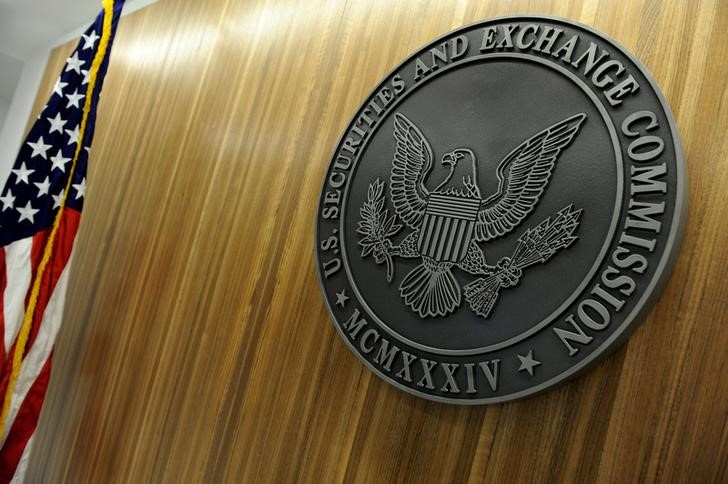 © Reuters. FILE PHOTO: The seal of the U.S. Securities and Exchange Commission hangs on the wall at SEC headquarters in Washington
© Reuters. FILE PHOTO: The seal of the U.S. Securities and Exchange Commission hangs on the wall at SEC headquarters in WashingtonBy Jonathan Stempel
NEW YORK (Reuters) – The New York investment adviser deVere USA Inc agreed on Monday to pay an $8 million civil fine to settle U.S. Securities and Exchange Commission charges it failed to disclose conflicts of interest to hundreds of clients with UK pensions.
Benjamin Alderson, 40, and Bradley Hamilton, 36, British citizens who until last year were deVere’s chief executive and a deVere manager, were also charged by the SEC with concealing the conflicts and misleading clients.
DeVere advised U.S. residents who once worked in Britain on the transfer of pension assets to overseas retirement plans that qualified for special British tax treatment.
From June 2013 to March 2016, the SEC said, deVere concealed arrangements with outside service providers related to that advice that resulted in payments to the firm.
The SEC said these arrangements gave deVere an incentive to provide advice that would lead to the payments, resulting in undisclosed compensation of $2.6 million for Alderson and $2.1 million for Hamilton.
“Investment advisers have an obligation to disclose direct and indirect financial incentives,” Marc Berger, director of the SEC’s New York office, said in a statement. “DeVere USA brushed aside this duty.”
Monday’s settlement requires deVere to hire an independent compliance consultant. The firm did not admit or deny wrongdoing.
In a statement, deVere said it is committed to treating clients fairly and settled to put the matter behind it.
The firm recently had $498 million of assets under management, a regulatory filing shows.
Lawyers for Alderson and Hamilton did not immediately respond to requests for comment.
The case is SEC v Alderson et al, U.S. District Court, Southern District of New York, No. 18-04930.
Fusion Media or anyone involved with Fusion Media will not accept any liability for loss or damage as a result of reliance on the information including data, quotes, charts and buy/sell signals contained within this website. Please be fully informed regarding the risks and costs associated with trading the financial markets, it is one of the riskiest investment forms possible.
Source: Investing.com



























